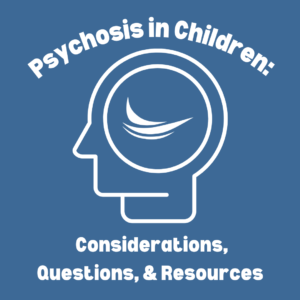Psychosis in Children: Considerations, Questions, & Resources
 While psychotic disorders are not commonly diagnosed in childhood, children exhibit symptoms of psychosis that can be concerning. Examples include the following:
While psychotic disorders are not commonly diagnosed in childhood, children exhibit symptoms of psychosis that can be concerning. Examples include the following:
- Hearing voices other people cannot hear
- Talking to the “voices”
- Experiences of paranoia
- Visual hallucinations—seeing things that others do not see
- Inability to distinguish dreams from reality
- Bizarre thoughts and strange behavior
- Negative symptoms including concerns about mental functioning
There are several considerations to consider such as genetic predisposition, social, and environmental factors. Also, sometimes what children may describe as voices could be their inner narrative, an imaginary friend, and/ or phenomena that may be consistent with religious/ spiritual beliefs and cultural practices, so it is important to thoroughly explore all factors.
If you have concerns, the first step is to talk to your doctor to rule out any medical causes that may be contributing and schedule an appointment with a mental health specialist. A therapist will complete a diagnostic assessment that will help ask about areas such as cultural factors, medical and mental health history, trauma history, substance use, and mental health symptoms.
Some questions that may be helpful for your provider to ask include the following:
- Tell me more about your cultural beliefs and any religious/ spiritual practices. Do any of these involve seeing things (e.g., visions, spirits), hearing voices (e.g., of ancestors, God) or
beliefs in things such as ghosts, spirits, angels, demons, folklore and/ or the supernatural?
- Is there a family history of anyone else experiencing similar symptoms? If so, how have these experiences impacted their daily functioning?
- Are there any medical conditions (e.g. epilepsy) or related mental health concerns such as perseverative thoughts? There are quite a few categories of mental health disorders that may include features of psychosis but not be indicative of a psychotic disorder!
- When was the onset of the concerns? Were there any stressful or traumatic events around that time?
- Are you currently using, or have you previously used any substances? How has this impacted your symptoms?
- Is there exposure to any frightening media content? Are there any strong childhood fears present?
- Is there any history of trauma such as physical or sexual abuse?
- Are there experiences of death or a significant loss in the family?
- Are there any problems associated with loneliness or relationships such as bullying or social isolation?
Asking more detailed questions about specific concerns such as hearing voices is recommended. Here are some examples:
Tell me more about the voices. How do you feel about hearing the voices? Are you ever frightened by them? Do they ever tell you to hurt yourself or others?
Tell me more about how many voices you hear and what they sound like.
How do your experiences impact your daily functioning? Is there anything you are no longer able to do?
These questions and considerations will help provide more context for your doctor and therapist to better understand what is going on and to help inform treatment options. Depending on the response, potential strategies may include:
- Medical evaluation and additional testing to rule out any medical causes
- Mental health evaluation to assess mental health and co-occurring concerns which may include a specialty referral for psychological or neuropsychological assessment
- Psychiatric evaluation is recommended if the voices are commanding the child to hurt/ kill themself or others
- Safety planning and a higher level of care options when there are elevated risk factors
- Therapy to address specific areas such as trauma, grief/ loss, and psychotic symptoms
- Possible medication options
- Psychoeducation on fear and fearful content
- Social outlets and group support
- Incorporation of community/ religious or spiritual supports such as prayer, cleansing rituals, and/ or comfort objects, as appropriate
Resources:
https://mhealthfairview.org/treatments/child-and-adolescent-strengths-program
https://mhealthfairview.org/conditions/Psychosis-First-Episode
https://www.mhanational.org/psychosis-schizophrenia-children-and-youth
Written By: Charlotte Johnson, MA, LPCC



























